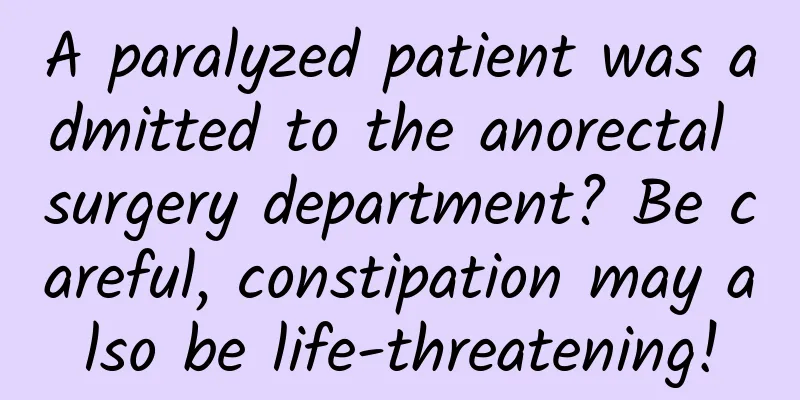A paralyzed patient was admitted to the anorectal surgery department? Be careful, constipation may also be life-threatening!

|
Recently, Ms. Li (pseudonym), a patient with lower limb paralysis, came to the Anorectal Surgery Department of Zhejiang University Run Run Shaw Hospital. Why would a paralyzed patient be admitted to the Anorectal Surgery Department? It turned out that Ms. Li had suffered from lower limb paralysis due to a spinal cord injury, which also caused neurogenic intestinal dysfunction and she suffered from constipation for a long time. This time, Ms. Li's constipation had reached a very serious level. Her stomach was as big as a balloon . She was sent to the emergency room directly because of the unbearable pain. The abdominal CT scan at that time showed: the colon was obviously dilated, with gas and a lot of contents. Because Ms. Li had been constipated for a long time, her colon was dilated, and the colon wall was thin. If this continued , there was a risk of perforation at any time, which could be life-threatening . Therefore, the doctor immediately admitted her to the anorectal surgery ward and carried out a series of targeted fasting, fluid replacement, and gentle enema treatments. Abdominal CT Two days after the enema, Ms. Li's abdominal distension improved slightly, but she still did not meet the discharge criteria. After fully communicating with her and her family about her condition and risks, and considering that life and health are the top priority , Ms. Li had to regretfully give up attending the wedding. After Ms. Li's abdominal distension improved slightly, the Department of Gastroenterology, Department of Traditional Chinese Medicine, and Department of Rehabilitation Medicine held a consultation, and then added treatments such as external application of Glauber's salt, acupuncture to promote gastrointestinal motility, and rehabilitation exercises . After a week of multidisciplinary comprehensive treatment, Ms. Li's abdominal distension improved significantly. Although it was a pity that she missed the wedding, with the joint efforts of Chief Physician Wang Da's team and other departments, Ms. Li was finally discharged smoothly. What is Neurogenic Bowel Dysfunction? Spinal cord injury with neurogenic intestinal dysfunction is a serious complication caused by trauma or non-trauma of the spinal cord, resulting in loss of neural control or complete loss of function of colon movement and/or sensation. What are the symptoms of neurogenic bowel dysfunction? Depending on the location of the spinal cord injury, different combinations of symptoms may occur, including constipation, fecal incontinence, abdominal pain, abdominal distension , etc. Constipation, as a common clinical manifestation of this complication, brings great pain to patients. Due to constipation, patients are forced to strain to defecate, which may lead to complications such as hemorrhoids, anal fissures, and anal prolapse . In addition to the above physical complications, it may also cause psychological problems , including depression and anxiety. Neurogenic intestinal dysfunction Why does constipation occur? After patients with neurogenic intestinal dysfunction develop intestinal dysfunction, on the one hand, the colon chronically expands, the colon tension gradually decreases , and the colon peristalsis slows down, leading to fecal stagnation and dryness; on the other hand, the pressure in the rectum gradually increases with defecation, the anal sphincter becomes tense, and the defecation time is prolonged , which together lead to constipation. Image source: pixabay Neurogenic intestinal dysfunction How to conduct a self-assessment? Some patients have mild constipation symptoms and do not receive enough attention, which will progress to stubborn constipation over time. Therefore, patients with spinal cord injury should learn to self-assess, the main contents include: Frequency of bowel movements (less than 3 times per week); The time it takes to defecate (whether it is more than 15 minutes); Whether defecation is difficult; Whether there is any assistance during defecation (such as finger assistance) etc. Neurogenic intestinal dysfunction How to treat constipation? 1 Daily Management A proper diet and drinking water are the most easily achieved treatment measures. Take ≥15g of dietary fiber every day , reduce the intake of insoluble fiber grains, and be cautious about consuming caffeine, alcohol and other foods. Drinking 1.5-2.0L of water every day can increase the frequency of bowel movements. 2 Drug treatment Commonly used oral laxatives include polyethylene glycol, lactulose, etc. Suppositories , such as glycerol suppositories, can lubricate and stimulate the intestinal wall and promote intestinal activity. Gastrointestinal prokinetic drugs , such as mosapride and prucalopride, move the contents of the gastrointestinal tract forward and reduce the time required for feces to pass through the intestines. 3 Anal enema Anal enema can empty the intestines regularly , improve patients' symptoms such as constipation, fecal incontinence and urinary incontinence, and thus improve their quality of life. 4 Traditional Chinese Medicine Intervention The application of traditional Chinese medicine in constipation patients is becoming more and more widespread. The drugs include oral administration of various traditional Chinese medicine compound preparations, enema, external application of mirabilite , etc. Non-drugs include acupuncture, massage, and meridian scraping , which can dredge meridians, harmonize yin and yang, activate the central nervous system, and regulate the intrinsic nerve control of colon smooth muscle to improve constipation. 5 Biofeedback and electrical stimulation Biofeedback and electrical stimulation regulate colon transit time by modulating sacral nerves, local skin nerves, and intestinal peripheral nerves. Biofeedback and electrical stimulation have synergistic effects and are recommended for combined use . 6 Surgical treatment Colostomy is a safe and accepted intervention for patients with severe constipation who have failed conservative treatment. 7 Psychological interventions Depression and anxiety have become common psychological problems in patients with neurogenic intestinal dysfunction constipation, and they are easily ignored. Providing reasonable psychological guidance to keep patients in a positive mental state is conducive to the recovery of the disease. Planning and production Source: Department of Anorectal Surgery, Run Run Shaw Hospital Author: Bai Bingjun Editor: Wang Mengru |
<<: I didn’t expect that you are like this on World Toilet Day!
>>: Please don’t step on the grass! Is it okay to step on the grass?
Recommend
What software are there for website promotion?
What software is available for website promotion?...
There are so many fried chickens, why no fried duck?
Audit expert: Wang Guoyi Postdoctoral fellow in N...
Promotion tips in the circle of friends in the education industry!
During the Spring Festival of 2020, the outbreak ...
Don’t let “eating while it’s hot” cause esophageal cancer! Do not exceed this temperature →
At the Chinese dinner table, we often hear the ph...
Online Advertising in Internet Business Monetization
This article introduces the product features and ...
17 classic marketing cases
Marketing Tips Fables Series 1: Two Salesmen This...
Why is “fashion” not a brand differentiation positioning?
Separating products from the multitude of brands ...
Can you see the bright spot in the middle of the picture? This bright spot is not simple!
As we all know, the Eiffel Tower is the most famo...
Are all 400 numbers legitimate?
The telephone number starting with 400 is a virtu...
Baojun is in the small car market. Why are Geely and Great Wall still indifferent?
No matter what kind of market it is, as long as y...
Cold wave + strong wind + sandstorm! If you are preparing to start work, please take these precautions!
1Cold wave orange warning! The Central Meteorolog...
Is there a "guide to picking wild vegetables in a closed community" circulating in the circle of friends? Experts give an urgent reminder
Recently, some rumors have been circulating onlin...
Spring Festival Event- Technical Solution for Peak Reward Distribution
Author: Zhang Jian 1. Background The 2022 Spring ...
Using technology to experience "X-ray vision"? Mothers no longer have to worry about not finding blood vessels when inserting needles?
What is the difference between humans and jellyfi...
Scalpers resell Tesla Model 3 reservations and earn 300% profit
According to a report by the financial website Ma...


![Chen Naiba's Douyin Book List Performance Course, the core skills and operating standards for quickly starting an account [Video Course]](/upload/images/67cc29ea1fbef.webp)






